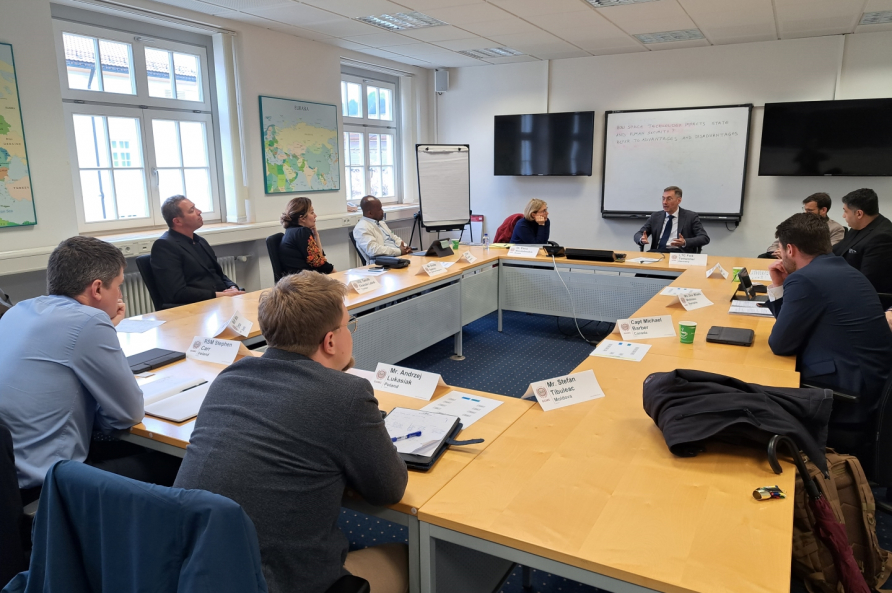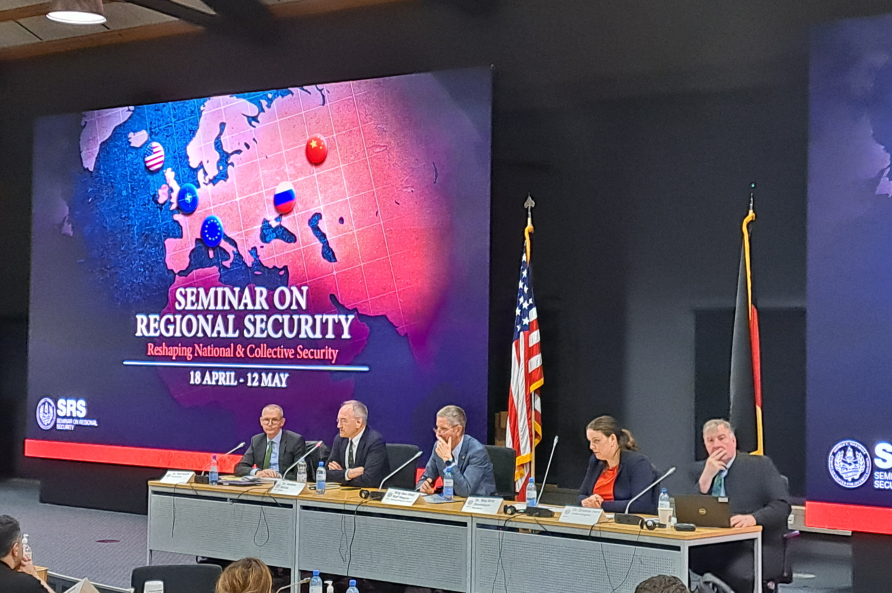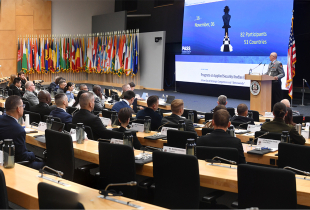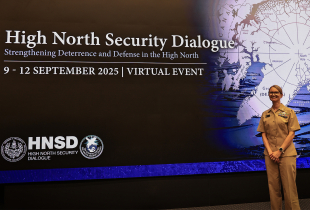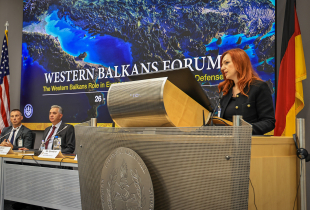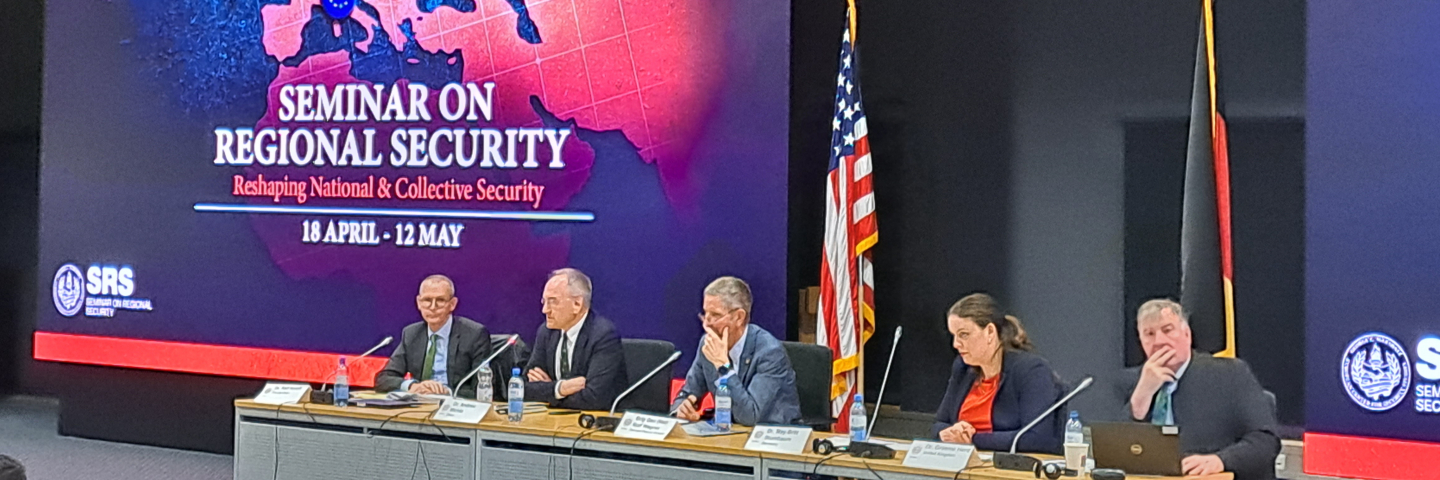
Seminar on Regional Security Turns Focus on Periphery of Europe
By: Dr. Bernhard Wigger, Col. Konrad Lau, Dr. Cüneyt Gürer, Jens Salander
Upon the launch of the George C. Marshall European Center for Security Studies’ flagship course on Regional Security Studies, course director Dr. Bernhard Wigger presented a historical artifact – a set of original Swiss trench binoculars from 1939, saying, “The War in Ukraine is the final proof that history did not stop with the end of the Cold War. Conventional war remains a major concern and a credible deterrence and defense have to be kept up at any time.”
Exhibited in the plenary hall throughout the seminar, the binoculars will serve as a vivid reminder of the current realities in Eastern Europe, while at the same time signifying the need for strategic focus and foresight. This was reiterated in the opening remarks of the Marshall Center director, retired Maj. Gen. Barre Seguin, to the 38 course participants from 31 different countries, in which he highlighted the need for “regional, transnational, and global cooperation to meet today's and tomorrow’s challenges.”
Russia’s invasion of Ukraine underpinned the discussion of the SRS’s first module and highlighted the multidimensional security implications not only for Europe but the entire international system. While the dean, Dr. Andrew Michta, outlined the geopolitical fault lines in today’s great power rivalry, Prof. Dr. Ralf Roloff, the deputy dean, provided a perspective on the current and future state of globalization. The module covered other ordering principles including the multilateral security institutions, legal frameworks and governance, all of which are currently being challenged. The driving forces behind these challenges were discussed at a high-level panel consisting of Marshall Center German Deputy Director retired Brig. Gen. Rolf Wagner, professor Dr. Graeme Herd, Team Leader Project Asia Pacific Security with German Armed Forces University Dr. May-Britt Stumbaum, and Roloff. With a changing balance of power, they concluded, the roles, relationships and worldviews of powerful actors like Russia, China, the EU and the U.S. are being redefined. In this context, the “system-transforming” war in Ukraine will be a crucial test for the resolve and resilience of the liberal world order.
Resilience proved to be a defining feature of the course’s second module. Beyond kinetic warfare between two states, competition, confrontation and conflict occur in the “grey zone,” as Marshall Center Associate Professor Dr. James Derleth explained. Hybrid threats, whether within or outside of the current legal or normative system, are particularly challenging for democracies. Transnational organized crime directly contests the primacy of the state and the rule of law. The cyber domain has blurred political and geographic delineations. Just like digitalized world transcends national borders, climate change presents a fundamental problem across regions and continents, as Marshall Center adjunct professor retired Cmdr. Andreas Hildenbrand vividly portrayed. With case studies from Switzerland and Sweden, Senior Advisor Executive Education at Swedish Defence University Pär Lager and Wigger presented ways and means to build structural and societal resilience and crisis preparedness. And as conventional war has returned to Europe, NATO turns its focus back on collective defense.
The panelists Georg Häsler, journalist and editor at Neue Züricher Zeitung, and General Major Jörg See, Deputy Assistant Secretary General for Defence Policy and Planning, NATO HQ – International Staff, discussed the return of conventional war to Europe. An outcome of this panel was that scale and complexity of today's strategic environment require comprehensive responses and that western states need to “invest more and invest better.” The stage is thus set for the NATO summit in Vilnius, which will mark an important step in NATO’s effort to strengthen the eastern flank and the alliance itself.
The third module cast an eye to the future. As Prof. Dr Kai-Uwe Schrogl, Special Advisor for Political Affairs at the European Space Agency explained, with increasing reliance on satellite technology, outer space will become ever more, “congested and contested.” Highlighting the relevance of security from space as well as in space itself, Schrogl predicted that “future war will likely either be triggered or at least preceded by events in space.” At the same time, future access to food, energy and resources will determine how states will cooperate. As the world economy becomes more regionalized, Dr. Michaël Tanchum, Professor of International Relations, Universidad de Navarra, stressed its dependencies and vulnerabilities, positing that “infrastructure indicates strategic intent.”
Challenging assumptions, perceptions and current languages of security, Marshall Center’s Lt. Col. Falk Tettweiler urged the “need to craft a narrative that focuses on cooperation.” This will be necessary not only to tackle current issues but for future developments in technology, as the current developments in artificial intelligence demonstrate.
The first two weeks of the Seminar on regional Security provided participants with in-depth, interdisciplinary and interactive sessions, leaving them with many questions, but also respective answers, ideas and approaches to addressing todays and tomorrow’s regional security challenges. During lectures and seminars, the different perspectives, experiences, and understandings of the multinational group provided a lively and highly productive debate. In the coming weeks we will see a regional focus on Europe’s East and South to apply and expand on regional security issues.
